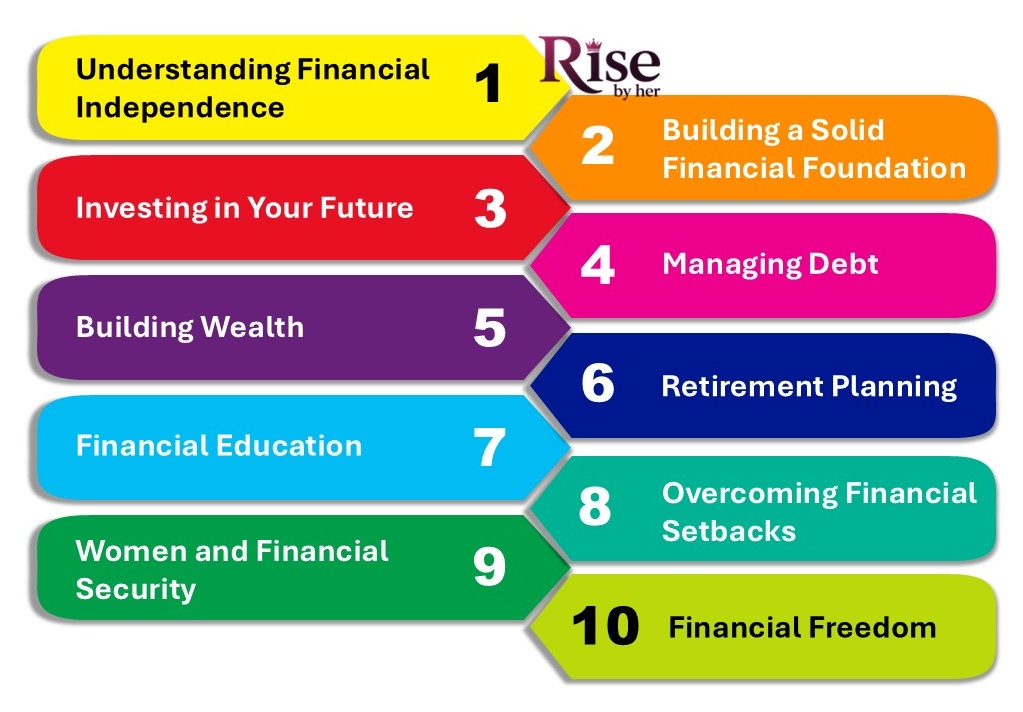Understanding Financial Independence: What It Means for Women
Financial independence is about more than just money, it’s about the freedom to make decisions that align with your values and goals. For women, it’s the ability to shape your life both personally and professionally without financial constraints.
What Does Financial Independence Mean for Women?
- Choice and Autonomy: The freedom to choose your career, lifestyle, and goals without relying on others.
- Independence from Others: Not depending on a partner, family, or employer for financial security.
- Security and Confidence: Knowing you can make decisions, like starting a business or prioritizing your health, without fear of financial instability.
Why is Financial Independence Important for Women?
- Longer Lifespan: Women generally live longer, requiring careful long-term planning for retirement.
- Overcoming Barriers: Financial independence helps break through wage gaps and unequal access to opportunities.
- Empowerment: It gives women the confidence to make bold decisions in both personal and professional life.
A Real-Life Example: Sarah’s Journey
Sarah left a corporate job to start a freelance business. By planning financially and prioritizing savings, she reached a point where her business provided financial freedom, allowing her to make life choices based on her values.
How Financial Independence Impacts Women’s Lives
- Professional: It allows women to negotiate better salaries, take career risks, or start their own businesses.
- Personal: It offers the freedom to make life choices, such as focusing on family, traveling, or pursuing passions.
Building a Solid Financial Foundation: Key Principles Every Woman Should Know
To build a secure financial future, every woman should start with these foundational principles. Regardless of where you are on your financial journey, these steps will help create a stable base for your financial independence.
Key Principles:
- Budgeting: Track your income and expenses to understand your spending habits. A budget is essential for managing money effectively and ensuring you can meet both your short-term and long-term goals.
- Saving: Start saving early. Even if you can only save a small amount at first, consistency is key. Aim to save at least 20% of your income and prioritize building an emergency fund with 3–6 months’ worth of living expenses.
- Understanding Credit: Your credit score can affect many areas of your financial life, from getting loans to paying lower interest rates. Keep your credit card balances low, pay bills on time, and check your credit report regularly to ensure its accuracy.
- Debt Management: Reducing debt is a crucial part of building financial independence. Focus on paying off high-interest debt first and avoid accumulating more unnecessary debt.
These foundational principles will help set the stage for future financial success.
Investing in Your Future: How Women Can Get Started
Investing is one of the most powerful ways to grow your wealth over time. However, many women hesitate to invest due to a lack of knowledge or fear of making mistakes. But investing doesn’t have to be complicated, and it’s never too late to start.

How to Get Started:
- Start Small: If you’re new to investing, begin with a retirement account like a 401(k) or IRA. These accounts offer tax benefits and are great for long-term growth.
- Invest in Low-Cost Index Funds: Index funds are a great way to diversify your investments and reduce risk. They track the performance of the market, meaning you can invest in many companies at once with low fees.
- Understand Your Risk Tolerance: Different investments come with varying levels of risk. It’s important to understand your risk tolerance and invest accordingly. As you get older, you may want to shift to safer investments, but starting early allows you to take on more risks for higher rewards.
Investing isn’t about making quick profits, it’s about steady, long-term growth. The earlier you start, the better positioned you’ll be for the future.
Managing Debt: Smart Strategies for Debt-Free Living
Debt can feel overwhelming but managing and eventually eliminating it is crucial to achieving financial independence. Whether you’re dealing with student loans, credit card debt, or other liabilities, it’s important to have a strategy in place to regain control.
Debt Management Strategies:
- Pay High-Interest Debt First: Focus on paying off credit card debt or loans with high interest rates first. This will save you money in the long run.
- Use the Debt Snowball or Debt Avalanche Method: The snowball method involves paying off the smallest debt first, while the avalanche method targets high-interest debts. Both strategies work but choose the one that motivates you most.
- Avoid Unnecessary Debt: Be mindful of taking on new debt. Before making purchases, ask yourself if it’s something you truly need or if it’s a want.
Getting out of debt requires discipline and time, but it’s a major step toward financial freedom. With the right strategies, you can regain financial control and work toward achieving your goals.
Building Wealth: Steps to Long-Term Financial Growth
Wealth-building is about more than just saving money, it’s about creating multiple streams of income, making wise investments, and having the mindset to focus on long-term growth.
Steps to Building Wealth:
- Diversify Your Income: Relying on one income stream can be risky. Look for ways to diversify your income, whether through side gigs, investments, or starting your own business.
- Set Long-Term Financial Goals: Whether purchasing a home, building your retirement savings, or investing in your business, having clear goals helps you stay focused and motivated.
- Live Below Your Means: It’s tempting to increase your spending as your income grows, but the key to building wealth is living below your means. This allows you to save and invest more.
Building wealth takes time and dedication, but with these steps, you can create a financial legacy that will serve you well in the future.
Retirement Planning: How Women Can Prepare for Their Golden Years
Planning for retirement is essential, and women need to take a proactive approach to ensure they’re financially secure in their later years. Women typically live longer than men, making it especially important to start planning early.

Steps to Prepare for Retirement:
- Contribute to Retirement Accounts: Contribute to a 401(k), IRA, or other retirement account, and try to take full advantage of any employer matches.
- Estimate Future Expenses: Project how much money you will need in retirement to maintain your lifestyle. This can help you determine how much to save each month.
- Consider Additional Income Streams: Think about ways to supplement your retirement income, such as starting a business or investing in real estate.
Planning for retirement requires discipline and foresight, but the earlier you start, the more time you have for your investments to grow.
Financial Education: Key Resources and Tools for Women
Financial education is a lifelong journey, but there are plenty of resources available to help you get started. The more you learn, the more confident you’ll be in making financial decisions.
Recommended Resources:
- Books: Some great reads include The Total Money Makeover by Dave Ramsey, Smart Women Finish Rich by David Bach, and You Are a Badass at Making Money by Jen Sincero.
- Online Courses: Websites like Coursera and Udemy offer financial literacy courses that cover budgeting, investing, and more.
- Podcasts: Tune in to personal finance podcasts like The Dave Ramsey Show, HerMoney, and BiggerPockets for expert advice and tips.
Knowledge is power by educating yourself about finances, you’ll be better equipped to make informed decisions and achieve your financial goals.
Overcoming Financial Setbacks: Resilience and Recovery
Everyone faces financial challenges at some point. Whether it’s an unexpected medical bill, job loss, or economic downturn, resilience is key to overcoming these setbacks.
Steps to Overcome Setbacks:
- Stay Calm and Assess: Take a deep breath and assess the situation objectively. What are your immediate needs? What can you control?
- Revaluate Your Budget: When faced with financial difficulties, it’s essential to cut back on non-essential spending and focus on your priorities.
- Reach Out for Help: Don’t be afraid to seek financial counseling or assistance if needed. Many organizations offer free advice or resources to help you manage debt or budget effectively.
Financial setbacks are inevitable, but your response to them can make all the difference. With the right mindset, you can overcome challenges and continue working toward financial independence.
Women and Financial Security: Building a Legacy
Building financial security isn’t just about supporting yourself, it’s about creating a legacy that can help future generations. Women have the power to pass down financial wisdom, resources, and opportunities to their children and families.

Ways to Build a Financial Legacy:
- Teach Financial Literacy: Empower the next generation by teaching your children about budgeting, saving, and investing.
- Estate Planning: Ensure that your wealth is passed on according to your wishes with a solid estate plan, including a will and trusts.
- Philanthropy: Consider giving back to your community or supporting causes that matter to you. Building a legacy isn’t just about money, it’s about leaving a lasting impact.
Financial Freedom: The Reward of Taking Control
Financial freedom is the ultimate reward for taking control of your finances. It means having the ability to live life on your own terms, whether that’s traveling the world, spending more time with loved ones, or pursuing your passions without worrying about money.
By following the steps outlined in this guide, you can work toward financial independence and achieve the freedom to create the life you truly desire. It’s not just about accumulating wealth; it’s about using your money to live authentically and pursue your dreams.
Conclusion
Achieving financial independence is not just about having control over your money but having control over your life. By understanding the fundamentals of budgeting, saving, investing, and managing debt, you can lay the groundwork for a secure and empowering future. Remember, financial freedom is a journey, and it begins with taking one step at a time. Every small decision you make today will bring you closer to living the life you’ve always dreamed of on your own terms.
Ready to take control of your financial future? Start by setting clear financial goals, tracking your progress, and making the choices that align with your values. The journey may seem daunting, but you have the power and knowledge to make it a reality.
Take the first step today, sign up for our newsletter for more tips, or start learning about investing. The road to financial independence begins with you, and we’re here to support you every step of the way!


